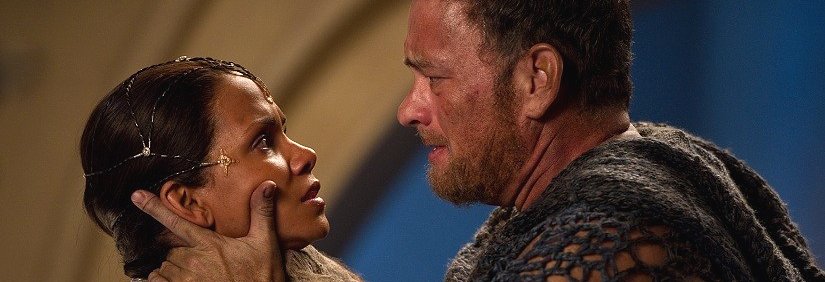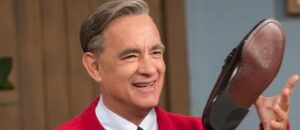‘Cloud Atlas’ is a perplexing construct of a film. It cannot be analyzed merely by describing and dissecting its plot, because its plot is ambiguous at best. Honestly, there might not even be a plot as defined by standard screenwriting terms. Instead, ‘Cloud Atlas’ feels like a free-flowing stream of consciousness that touches on different human wants, needs, emotions and ideals along the way.
The last time I left a movie theater feeling anxious about what I’d just seen, with an immediate desire to see the movie again in order to piece together everything I may have missed, was Terrence Malick’s ‘The Tree of Life‘. Like that film, ‘Cloud Atlas’ is destined to become a very divisive film among moviegoers. It will certainly evolve into a love-it-or-hate-it discussion that is sure to send film fans to movie message boards praising or picking apart its merits or lack thereof.
With that said, I haven’t made up my mind just yet. The exact sentence I wrote down when I handed my comment card to the studio rep was: “I think I loved it, but I have no idea why. I need to see it again.”
‘Cloud Atlas’ is a gargantuan epic that spans time periods as seamlessly as other movies fade-out from one scene and fade-in to another. Its collection of stories play like a string of echoes reverberating through the movie’s chopped-up storyline. It requires that you be mentally aware of what’s going on, of what themes and motives are being discussed, and what it’s trying to tell you. This isn’t a movie that you can plop down in front of, enjoy for an hour or two, and then walk out. It’s a wholly involving narrative that plays with your senses as much as it does your emotions.
It’s almost impossible, after only one viewing, to get a handle on what the film is about. I highly doubt that it’s about any one thing, which is why multiple viewings seem necessary whether you end up liking it or not.
Based on the novel by David Mitchell, ‘Cloud Atlas’ tells six different stories spanning completely different time periods. We hop from one time to the next, meeting different characters, yet most of them are played by five or so leads. (Head on over to IMDb to check out the cast list. Each actor is credited with five or six different parts. Just looking at the list is enough to make your head spin.) Are the characters reincarnated? Are they simply descendants of the people that came before? These questions are left up to you to decide.
We ping-pong through time from the Pacific Islands in 1849, to 1963 Cambridge, to 1973 San Francisco, to present day London, to 2144 Neo Seoul, to a distant post-apocalyptic dystopian future. All six stories are populated with intriguing, though-provoking tales about characters who seem to connect to the other time periods through thin threads. These threads run through the narrative, loosely binding it without driving each story together by force.
To discuss what happens in each of these different stories would be futile. They’re interconnected and become a sum of their parts once the end approaches. Instead, one could discuss how this narrative and the editing piece the story together with absolute aplomb. Co-directors Tom Tykwer and the Wachowski siblings have been able to piece together this complex narrative with inspired editing. The editing makes the story understandable. Without it, we’d be lost in a sea of information with no direction.
We hop from one story to the next as answers to questions in one timeline are posed in another far-off time period. These stories don’t play out in a linear sense. Instead, they seem pancaked on top of one another, like strata of earth and rock, holding each other up with what came before and pressing down with what happens later. Everything is connected. The stories truly act as echoes. What happens in the past affects the present, and what happens in the future is learned from the past.
Some weighty subjects are contemplated in this movie. Wrapping your head around them is a true test. One underlying theme that resonated with me was the idea of change in people. Whether these characters are reincarnated or simply descendants from earlier generations, there’s still this idea of the past affecting the future. Hugo Weaving plays a dastardly villain in each story. Obviously, he couldn’t overcome his pre-ordained path of villainy. On the other hand, we see evidence that the string of selfish ideals can be broken. It’s hard, but truth finds a way.
The movie has its faults, but it’s so earnest in its portrayal of life that faults were a necessary evil. The many moments of brilliant lucidity definitely outshine the liabilities (such as some ugly facial prosthetics used on the actors from one story to another).
If this review seems more like a free association of thoughts, ‘Cloud Atlas’ feels the same way much of the time. It’s a movie experience. Whether you love it or hate it, you’ll definitely remember it. The film will stick with you.
Rating: 








HuskerGuy
Sort of like your review card, I have a very strong desire to see this, but I’m not entirely sure why. Can’t wait to check it out this weekend.
Kevin
I am extremely pissed off that the stupid theater where I live ISN’T playing this movie, yet they devoted two screens to that new “Silent Hill” movie.
Shannon Nutt
So it’s comparable to “Tree of Life”? I’ll pass for now then…I thought it was visually stunning, brilliantly directed, and had very little to say. Sounds like “Cloud Atlas” might be more of the same. Should look great on Blu-ray though. 😉
Aaron Peck
AuthorIt’s comparable in as much as it explores things rarely explored in modern cinema. On a storytelling front they’re completely dissimilar.
The only reason I brought up ‘Tree of Life’ is that it and ‘Cloud Atlas’ feel like epic undertakings that require more than one viewing to take in what they have to offer.
CxDx
it feels like a more expansive, and expensive retelling of “the fountain” to me…
Josh Zyber
There are similarities, certainly. This one’s a bit more accessible.
Tom Landy
I don’t know. Every trailer I’ve seen for Cloud Atlas looks really, really stupid. It worries me to even think about seeing this.
CK
I’d be really excited about this movie if it were not for the cast. I’ve gotten really sick of Tom Hanks, somehow just the sight of him is annoying now and I can’t look past him to the character anymore. Halle Berry has always been the low point of everything I’ve ever seen her in. I don’t know how big a part she has, but Susan Sarandon irritates me a bit as well, though, not enough to shoot a movie down herself. On the other hand, I like Hugo Weaving, but he can’t offset the rest of the cast.